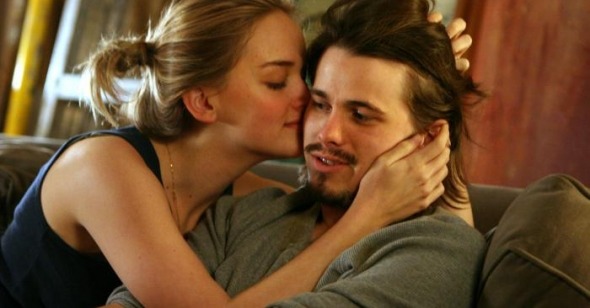By the Book of Love
By Kristi Mitsuda
Peter and Vandy
Dir. Jay DiPietro, U.S., Strand Releasing
Intended as a romantic comedy for the indie set, Peter and Vandy—written and directed by Jay DiPietro and based on his play of the same name—starts out promisingly enough despite its predictable predilection for Pitchfork-sanctioned songs. Its opening scene has Vandy (Jess Weixler) declaring a first, postcoital “I love you” to Peter (Jason Ritter), the latter teasing, “I love you, too . . . and you’ve known that for a few hours now.” Cut to a prelude a few hours prior as Peter caps off a three-week anniversary toast by declaring his love to a startled Vandy. Conceived as a compare/contrast portrait of a relationship, the film moves forward fitfully in this vein, eventually featuring the twentysomething couple’s honeymoon period and fizzling out in side-by-side sequences. Although the structuring gimmick gets tired—until revived again by a slight twist toward the end—initially it adds a layer of intrigue as the viewer attempts to piece together the puzzle of the relationship’s demise.
Rewinding from the in medias res introduction, Peter and Vandy relays the meet-cute moment: Vandy, body language signaling disinterest, finds herself unexpectedly compelled by Peter’s convoluted attempts at conversation; apparently, he rambles on, the food vendor from whom she just bought lunch can grill up some chicken and put it on a bed of lettuce instead of rice—a salad for only $3.50 in Manhattan!—if she ever, you know, feels like eating something less fattening than the fried rice she’s currently eating. Vandy starts falling for Peter right then. Shortly thereafter, the movie skips ahead to some indeterminate middle-point in the couple’s relationship as they bicker pointlessly over whether to eat out or order take-out. Unfortunately, juxtapositions of this sort are the engine driving DiPietro’s film. Striving to chronicle the heady beginning and rocky end of a relationship in order to illuminate its inner workings, the first-time filmmaker never manages to offer up more than clichéd observations, and his insistence on connecting the most obvious dots for the viewer leaves no room for real resonance.
Key turning points in Peter and Vandy’s relationship are visualized in this facile fashion. DiPietro cross-cuts between sequences capturing an overly solicitous, early-relationship Peter insisting on carrying grocery bags for a struggling Vandy, and a latter-day Peter seemingly oblivious that she’s fallen behind him while trying to wrangle shopping bags home. Later, Peter responds to flirtatious overtures from new-girl-in-the-office Michelle (Kristina Klebe) by volunteering to assist her in transporting a bunch of binders, and the director—just in case we miss the parallel—inserts an image flashing back to Peter hoisting Vandy’s grocery bags. In a similarly blunt correspondence, one scene showcases him starting a fight superficially stemming from his annoyance over Vandy’s usage of “PB&J” instead of “peanut butter and jelly,” even as another captures him utterly charmed by Michelle’s reference to “barbeque” as “BBQ.” Other twinned scenes gesture rotely toward the irony of Vandy’s exclamation—upon listening to a friend berating her husband for tipping the bartender at a wedding—“I would kill you if you talked to me like that.”
Rather than offer up nuanced glimpses into the couple’s private world in order to balance out the broad strokes, DiPietro seems intent on hammering home the banal. Clocking in at just 80 minutes, the movie spends so much of its time outlining the trajectory—not that it needs much establishing in the first place since it’s based on the most basic clichés of coupledom—it never gets around to fleshing the characters out. Not to say it doesn’t try; the film at least attempts to conjure a particular persona for Peter, but his most notable quality, a tendency to over-apologize, comes off as a cultivated quirk rather than deeply indicative of character. Peter and Vandy remain ciphers, boringly progressing from young couple in love to bickering long-timers. And moment to moment the movie feels so schematic that you never get the sense you’re witnessing the organic evolution of a relationship, making it impossible to muster much emotion or interest.
